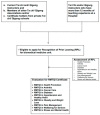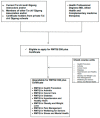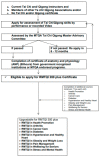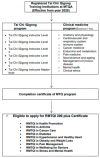Accreditation Standard Guideline Initiative for Tai Chi and Qigong Instructors and Training Institutions
- PMID: 29890675
- PMCID: PMC6023434
- DOI: 10.3390/medicines5020051
Accreditation Standard Guideline Initiative for Tai Chi and Qigong Instructors and Training Institutions
Abstract
Evidence of the health and wellbeing benefits of Tai Chi and Qigong (TQ) have emerged in the past two decades, but TQ is underutilized in modern health care in Western countries due to lack of promotion and the availability of professionally qualified TQ instructors. To date, there are no government regulations for TQ instructors or for training institutions in China and Western countries, even though TQ is considered to be a part of Traditional Chinese medicine that has the potential to manage many chronic diseases. Based on an integrative health care approach, the accreditation standard guideline initiative for TQ instructors and training institutions was developed in collaboration with health professionals, integrative medicine academics, Tai Chi and Qigong master instructors and consumers including public safety officers from several countries, such as Australia, Canada, China, Germany, Italy, Korea, Sweden and USA. In this paper, the rationale for organizing the Medical Tai Chi and Qigong Association (MTQA) is discussed and the accreditation standard guideline for TQ instructors and training institutions developed by the committee members of MTQA is presented. The MTQA acknowledges that the proposed guidelines are broad, so that the diversity of TQ instructors and training institutions can be integrated with recognition that these guidelines can be developed with further refinement. Additionally, these guidelines face challenges in understanding the complexity of TQ associated with different principles, philosophies and schools of thought. Nonetheless, these guidelines represent a necessary first step as primary resource to serve and guide health care professionals and consumers, as well as the TQ community.
Keywords: Qigong; Tai Chi; accreditation; certification; guideline; standards.
Conflict of interest statement
The authors declare no conflict of interest.
Figures





References
-
- Campo R.A., Agarwal N., LaStayo P.C., O’Connor K., Pappas L., Boucher K.M., Gardner J., Smith S., Light K.C., Kinney A.Y. Levels of fatigue and distress in senior prostate cancer survivors enrolled in a 12-week randomized controlled trial of Qigong. J. Cancer Surviv. 2014;8:60–69. doi: 10.1007/s11764-013-0315-5. - DOI - PMC - PubMed
LinkOut - more resources
Full Text Sources
Other Literature Sources
Miscellaneous

